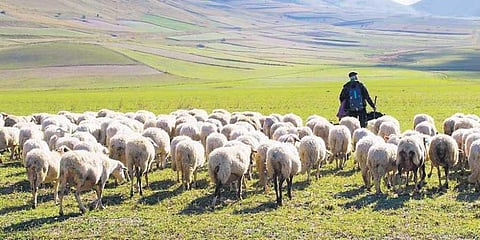

NEW DELHI: Pastoral communities from across the country are facing severe difficulties in carrying on with their traditional occupations and have been largely left out of government’s relief measures, said a status report on how the lockdown due to COVID-19 has impacted the communities.
Access to grazing and migration was restricted due to the lockdown which posed a major challenge before the pastoral communities -- a majority of whom are nomadic and migrate to high altitudes in the summer for their cattle to graze there, the report by Centre for Pastoralism pointed out. The Himachal Pradesh government was an exception which allowed seasonal migration of the communities, it said.
“The pastoralists are seasonal migrants. According to estimates, there are 35 million pastoralists. The migration routes are different - inter-state, within state and in some cases, within districts,” said Ramesh Bhatti, programme director, Centre for Pastoralism.
With a majority of pastoralist communities being seasonal migrants, they are losing out on rations as their ration cards are from the states they originally hail from, the report observed. “They should get ration cards that are transferable and can be accessed from different states. There is also an immediate need to enumerate the mobile pastoral communities,” said Bhatti.
The other major challenges faced by the communities was problems with sheep shearing, challenges of procuring and selling milk and selling meat, the report found.
Pastoralists from various parts of the country also reported facing social stigma because of their religion and their nomadic lifestyle.
“Gujjars in Uttarakhand usually rely on selling milk. In some instances, administrations stopped them from selling milk. In other cases, milk is sold both in the morning and evenings. While selling milk in the evening has completely come to a halt, selling it in the morning is also challenging for them,” said Tarun Joshi, coordinator, Van Panchayat Sangarsh Morcha.
The report recommended that the Centre and state governments should coordinate to ensure pastoralists can take their cattle for grazing and enable migration. Governments should provide veterinary support while the cattle are on migration, it said. Governments should facilitate pastoralists can sell milk and meat in the markets.
In February, the Ministry of Tribal Affairs had constituted an expert committee on improvement of recognition and vesting process of community rights under the Forest Rights Act with a special focus on seasonal resource access to nomadic and pastoralist communities.